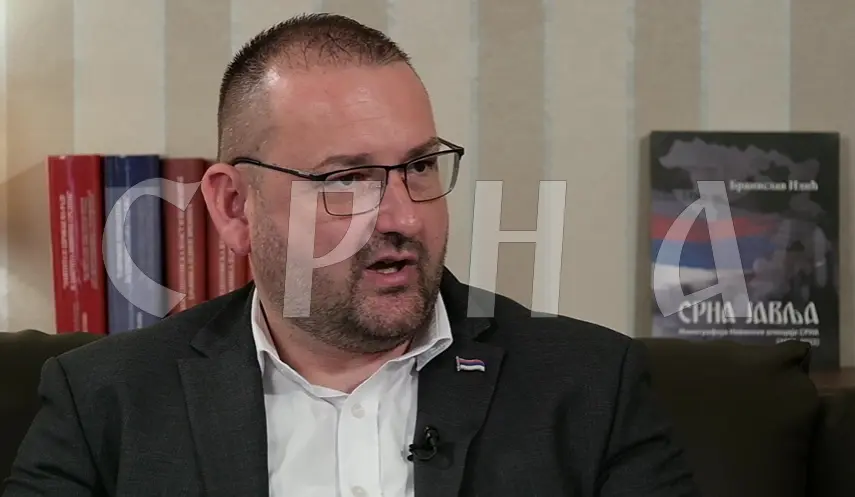NUŽDIĆ: SPREADING TRUTH ABOUT SUFFERING OF SERBS THROUGH INTERNATIONAL ACADEMIC COMMUNITY
Republika Srpska - SRNA - podcast
06/21/2025
11:56

BANJA LUKA, JUNE 21 /SRNA/ – The acting director of the Republic Center for War Research, War Crimes and Missing Persons, Viktor Nuždić, stated to SRNA that the only way to spread the truth about the suffering of Serbs during the Defensive-Patriotic War is through presenting facts to the international academic community.
“Educated people around the world see that something doesn’t add up. We’ve had visitors from other language and cultural backgrounds who said the ‘truth’ seems too one-sided and that they want to hear the other side of the story,” Nuždić said in the SRNA podcast.
He emphasized the need to change the mindset of the collective West through engagement with the academic community.
Nuždić stated that the Atlas of Crimes Against Serbs in the Defensive-Patriotic War is a major work by the Center that provides documented proof that Serbs were not aggressors in BiH, helped prevent manipulation of victim numbers, and revealed the character of a war in which mass crimes were committed against Serbs.
He noted that understanding the Defensive-Patriotic War is impossible without considering the context of World War II and the genocide committed against Serbs in the Independent State of Croatia (NDH).
“We have primarily focused on the victims, but not only them — also on the heroes, because we must always remember that the Serbian people, in addition to being a nation of suffering, is also a nation of heroes,” Nuždić emphasized.
He highlighted the Register of Victims of the Defensive-Patriotic War as one of the most important publications of the Center, explaining that it is the only institutional registry of its kind compiled not only in Republika Srpska but in the region as a whole.
Nuždić explained that the institutional approach to the victim register was aimed at preventing manipulation of victim numbers.
He noted that the Atlas of Crimes Against Serbs in the Defensive-Patriotic War emerged from this registry, and that the third volume was promoted in Banja Luka on June 17.
“The first volume covers the year 1992, the second 1993, and the third 1994. Our task now is to complete the volume for 1995. Only then will we have a complete and comprehensive study on the suffering of Serbs during the Defensive-Patriotic War,” Nuždić said.
He pointed out that the first volume of the Atlas alone covers 76 massacre sites over 1,200 pages.
“The very creation of the Atlas was tied to our desire to identify certain patterns that occurred during the war. The number of massacre sites in 1992 alone shows a clear pattern — it helps dispel the myth that Serbs were prepared for war, that they were aggressors, and all the other narratives coming from the other side. If Serbs had been prepared for war, we wouldn’t have had 76 massacre sites just in 1992,” Nuždić emphasized.
He also said that the perpetrators of crimes against Serbs at most of the sites documented in the Atlas have not been prosecuted to this day.
“Some cases are in process, such as the one involving the former Dobrovoljačka Street in Sarajevo, and the crime in Čemerno. We’ve also had cases like the recent acquittal of [former commander of the 4th Corps of the so-called Army of BiH] Ramiz Dreković, who was cleared of charges for war crimes against Serbs in Kalinovik,” Nuždić said in the SRNA podcast.
He described the judiciary at the BiH level as absurd, noting that almost all cases end the same way — without justice for Serbs and without convictions.
Nuždić stated that the number of Serb victims is being minimized by Bosniak politicians and certain elites who have consistently diminished Serbian suffering throughout the 20th century.
He concluded by stating that the Atlas of Crimes Against Serbs has also demonstrated that the Republika Srpska Army established clear lines of demarcation and saved the Serb people from a repetition of the genocide committed against them between 1941 and 1945.

SERBS IN TEARS AND FEAR OVER OWNERSHIP OF ORTHODOX CEMETERIES AND CHURCHES

CVIJANOVIĆ DEMANDS ACCOUNTABILITY FOR SHAMEFUL CONCERT IN ŠIROKI BRIJEG

OSTOJIĆ URGES BiH AND EU TO ACT OVER GLORIFICATION OF FASCIST IDEOLOGIES





